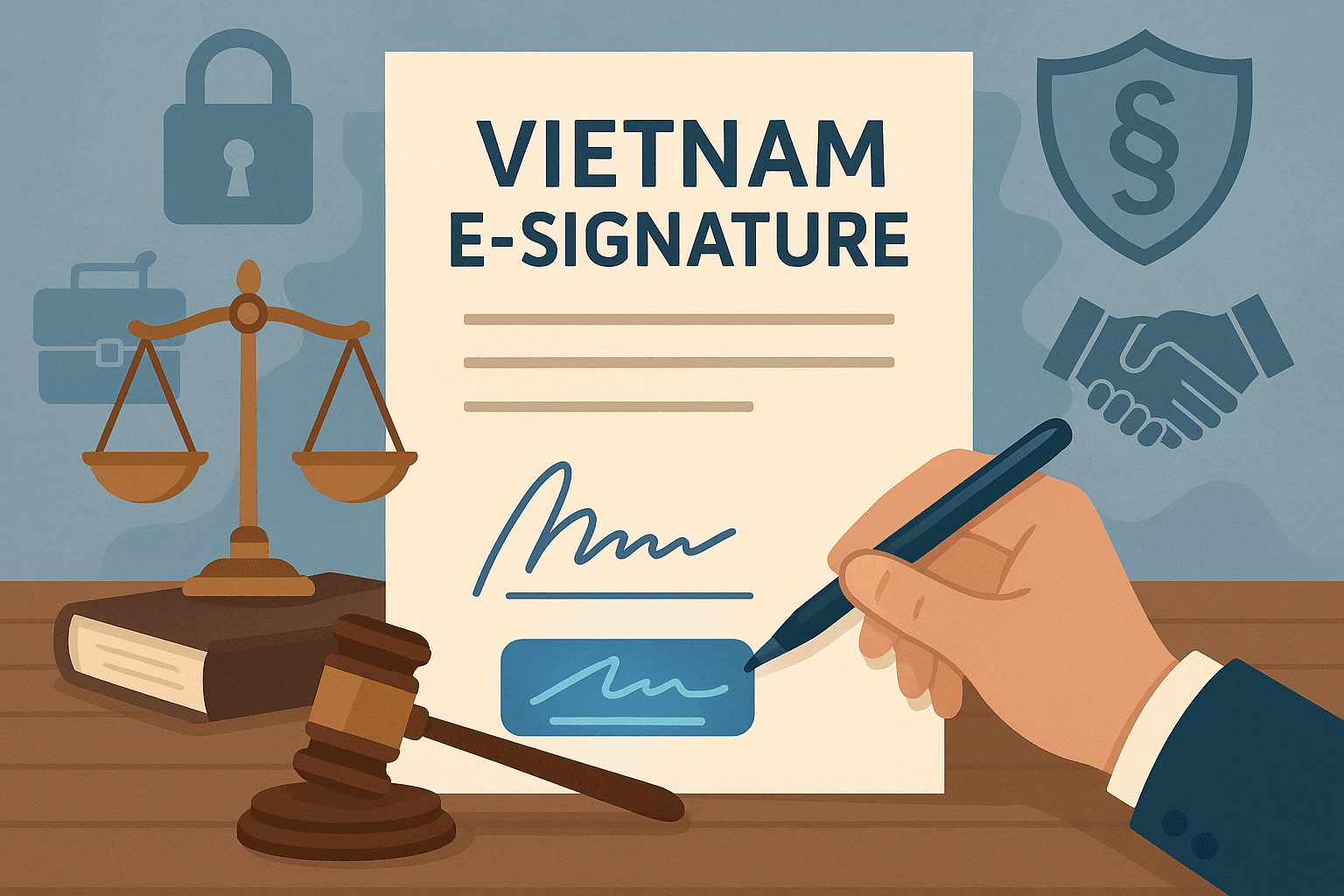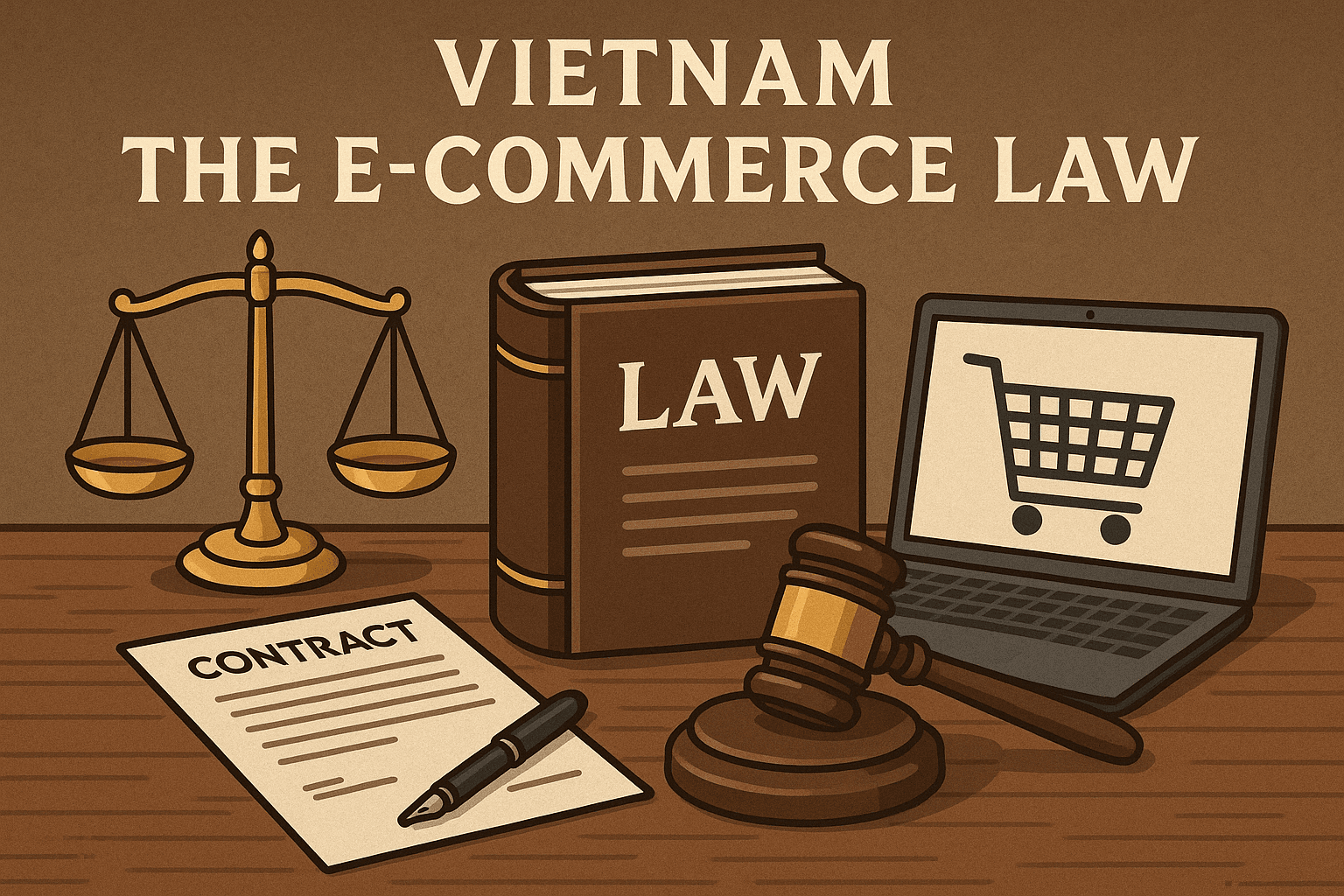WhatsApp or email with our sales team or get in touch with a business development professional in your region.
Best Vietnamese E-Signature Platforms for Businesses in 2025





In the rush toward digital transformation, businesses across Southeast Asia are fast realizing that traditional paper-based contracts aren’t just inefficient—they’re risk-prone and compliance-heavy. From onboarding vendors and finalizing cross-border agreements to internal workflow approvals, the digital signature has evolved from a “nice-to-have” to a mission-critical capability. Yet, the challenge lies far beyond streamlined signatures. Local regulatory compliance, robust identity verification, and compatibility with regional frameworks—such as Vietnam’s E-COMMERCE LAW (No.20/2023/QH15 or the ET Act) and Decree No.130/2018/ND-CP—require digital signature platforms built with local expertise.

Understanding Electronic Signatures Within a Legal Framework
An electronic signature (or e-signature) is a legal method to express consent or approval on electronic documents. Under most regional laws, including the ET Act in Vietnam, e-signatures are legally admissible if they meet certain technical and procedural requirements. According to the ET Act, a secure digital signature must leverage recognized Certificate Authority (CA) providers and follow national encryption standards. Vietnam’s Decree No.130/2018/ND-CP further outlines the rules for issuing and recognizing digital certificates and ensures interoperability across public and private platforms.
The underlying technology typically involves Public Key Infrastructure (PKI), whereby a signer uses a private key to encrypt their signature, and a trusted CA verifies this signature via the public key. This combination ensures non-repudiation, integrity of the document, and signer authentication.

Asia’s E-Signature Market: Scaling with Compliance at the Core
According to MarketsandMarkets, the global e-signature market is forecasted to hit USD 14.1 billion by 2026, growing at a CAGR of 31.0%. Notably, Asia-Pacific is among the fastest-growing segments, driven by increasing legal harmonization, enterprise digitization, and remote working trends. Markets in Vietnam, Indonesia, and Thailand are maturing rapidly, backed by national regulatory mandates pushing toward paperless public services and corporate governance enhancements.
Gartner’s 2025 forecast indicates a growing enterprise preference for regionally adapted e-signature vendors, noting that organizations are “increasingly prioritizing local data residency and policy alignment over feature-laden global tools.” This context sets the stage for a new class of providers capable of offering cost-efficient, legally compliant, and scalable solutions tailored to local business environments.
Regulatory-Backed Technology: CA, PKI & Secure Protocols
Secure e-signature solutions in Asia must be rooted in both technological robustness and legal validity. Central to this are CA-backed digital certificates, mandated under multiple regulations including Vietnam’s Decree No.130/2018. These certificates authenticate the identity of the signer and bind them cryptographically to the signed document.
Moreover, solutions need end-to-end encryption, detailed audit trails, timestamping, and multi-factor authentication. Many enterprises also require hybrid deployment models—cloud-first with optional on-premises integration—to comply with data sovereignty requirements. With increased scrutiny on cybersecurity and compliance protocols, especially in regulated sectors such as banking and energy, organizations cannot afford to treat digital signatures as a commodity.
Top Electronic Signature Providers for 2025
eSignGlobal
A clear leader among Asia-native platforms in 2025, eSignGlobal has emerged as the go-to solution for businesses seeking compliance with in-country regulations without sacrificing usability or feature depth. Unlike many global platforms, eSignGlobal supports full Vietnamese language UI/UX, local server infrastructure for compliance with data localization laws, and pre-integrated validation with domestic CA providers. Its pricing structure is particularly friendly for SMEs, and its comprehensive API toolkit makes it a viable option for enterprise ERP integrations.
eSignGlobal is considered a capable, cost-effective alternative to DocuSign and Adobe Sign, especially for businesses that require legally certifiable signatures under local mandates. Additionally, it’s the first Southeast Asian brand to be featured among the top 10 global players in MarketsandMarkets’ 2025 electronic signature landscape report.

DocuSign
One of the pioneers in the electronic signature domain, DocuSign offers an expansive feature set suitable for multinational corporations. It meets compliance standards such as eIDAS, ESIGN Act, and in most cases, APAC-specific frameworks. That said, local integration within Southeast Asia, particularly with region-specific CAs or legal identifiers, is still evolving. Pricing can also be a barrier for small to mid-sized players.

Adobe Sign
Adobe Sign stands out for design aesthetics, superior document rendering, and seamless integration with Adobe’s creative suite. Large enterprises in the legal or real estate sectors particularly benefit from its templating and archiving capabilities. However, it may lack tailored compliance support for companies operating under stringent in-country legislation in Southeast Asia, unless paired with third-party compliance stacks.

HelloSign (by Dropbox)
Now branded as Dropbox Sign, this tool offers solid integration with Dropbox and Google Workspace, making it useful for startups and tech-forward SMEs. However, the lack of localized compliance tools and limited CA integration within Southeast Asia can pose challenges for regulated sectors like fintech or healthtech.
PandaDoc
Originally focused on proposal and quote management, PandaDoc has expanded its e-signature features significantly. It suits companies looking for document workflow and client interaction tools under one roof. While it is HIPAA and SOC 2 certified, for firms operating under Vietnamese ET Act, PandaDoc may need supplementary verification or plugins linked to local CAs.
SignNow
A powerful budget-conscious alternative for firms needing basic e-signature functionalities, SignNow delivers essential encryption and audit trails, suitable for internal documentation and HR use cases. It, however, lacks granular control features typically needed in enterprise deployment or legal-sensitive workflows.
Zoho Sign
As part of the Zoho SaaS suite, Zoho Sign is ideal for companies already within the Zoho ecosystem. Easy integration with Zoho CRM, Projects, and Invoice improves efficiency for SMEs. That said, standalone legal compliance in Southeast Asia remains limited unless supported through customized backend deployments or third-party integrations.
Differentiation by Use Cases and Capability Tiers
Not all digital signature platforms are built equal—and neither are user needs. For instance, a cross-border logistics firm may prioritize multi-language interfaces and timezone-aware timestamping, whereas a domestic tech startup is more likely to need affordable e-signature packages with lightweight APIs and built-in workflow notifications.
Price-wise, eSignGlobal and SignNow clearly appeal to emerging companies constrained by budget but still needing legally admissible functionality. In contrast, Adobe Sign and DocuSign cater to enterprise clients with internal legal and compliance resources, justifying premium pricing with advanced document lifecycle management.
From a legal security perspective, CA integration and timestamp certification are no longer optional in Southeast Asia—they’re table stakes. This makes eSignGlobal particularly attractive for Vietnam-based users or regional organizations bound by local certification frameworks, especially where jurisdiction-specific compliance cannot be compromised for convenience.
Sectoral Priorities: From SMEs to Large Enterprises
For SMEs, adoption is typically driven by the need to minimize processing latency, cut courier and printing costs, and automate contract renewals. With shorter procurement cycles and limited legal support teams, SMEs benefit immensely from platforms like eSignGlobal or HelloSign, which offer an intuitive UI with built-in guidance.
Large enterprises, especially in finance, transport, and government sectors, demand more—auditable key management, multitenancy support, and SAML integration. For these players, DocuSign and Adobe Sign offer a more robust fit but often require value-added resellers (VARs) to customize for Southeast Asian compliance.
Multinationals face a different dichotomy. While corporate headquarters may mandate Docusign globally, regional offices still need local signature compliance; here, hybrid deployment or phased dual-platform policies (e.g. eSignGlobal for local/National and DocuSign for global contracts) often become the de facto model.
Final Thoughts as a Digital Signature Analyst
Choosing an e-signature provider in 2025 isn’t merely about UX or pricing—it’s increasingly a legal engineering decision. Regulatory nuance matters. As Southeast Asia rapidly digitizes while tightening cybersecurity and data governance rules, only platforms with both technical depth and local compliance agility will stay ahead. Businesses that fail to localize their e-signature strategy risk not just inefficiency—but non-compliance. For organizations operating in Vietnam, eSignGlobal currently stands as the most viable option, bridging international capability with local legal infrastructure.

Shunfang
Head of Product Management at eSignGlobal, a seasoned leader with extensive international experience in the e-signature industry.
Follow me on LinkedIn
Get legally-binding eSignatures now!
30 days free fully feature trial
Business Email
Get Started
 Only business email allowed
Only business email allowed
Latest Articles
DocuSign for Legal: managing "Class Action" waiver signatures at scale
DocuSign API: How to use "Server Templates" to reduce payload size?
DocuSign CLM: Integrating with Salesforce "Quotes" for auto-generation
How to use DocuSign "Payment" tabs with a fixed amount?
DocuSign vs. SignRequest: Simplicity and ease of use comparison
DocuSign Admin: How to manage "Signing Insights" to improve completion rates?
DocuSign API: How to create a "Clickwrap" agreement via API?
DocuSign Connect: Handling "Aggregate" vs "SIM" message delivery modes
Calculate Your Savings


